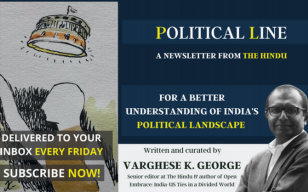Here is the latest edition of the Political Line newsletter curated by Varghese K. George
To be, or not to be — like Kerala
This week, the entire newsletter is around questions related to federalism – Centre-State relations and the organising principles of India as a nation. So I am not marking out a separate Federalism Tract segment.
Prime Minister Narendra Modi responded to Congress Rahul Gandhi’s speech on federalism and diversity by terming it separatist and divisive; Mr. Modi also said the Congress party was taken over by ‘urban Naxals.’
Prime Minister Narendra Modi addresses the Rajya Sabha on February 8, 2022. Photo: Twitter/@narendramodi
Jobs for locals
The Haryana government has moved the Supreme Court to restore a State law that reserves 75% private jobs up to a particular level to domiciles, after the High Court stayed it. The State has a BJP-led coalition government, and the party publicly stands for a ‘One Nation’ policy. Haryana is not the first State to have enacted laws that reserve jobs for locals. Such laws challenge the conception of India as a nation — where citizens have constitutionally guaranteed rights that are restricted according to domicile only in rare cases. This piece discusses the constitutional questions arising out of Haryana’s nativist politics. This article also points out that for reservations, same considerations may not be equally applicable in education and employment.
Meanwhile, the Haryana government is moving towards a new law to restrict religious conversions.
NEET closure? Not quite
Tamil Nadu’s attempts to restore its powers in admissions to medical schools in the State are continuing, in the face of resistance from the Governor. The State Assembly has passed the NEET Exemption Bill to reclaim its powers for a second time, after it was returned by the Governor. The national admission policy goes against the spirit of federalism and social justice, Chief Minister M.K. Stalin told the State Assembly. He also said the Tamil Nadu’s Legislature’s sovereignty and rights must be preserved. A succinct backgrounder and the State’s arguments can be found here, in Mr. Stalin’s own words.
Now that the law has been passed again, what can or will the Governor do? Is this going to be a conflict between the Centre and Tamil Nadu? Constitutionally, the President has the power to hold back the Bill or not deny assent. The role of the Governor and the President in this process is explained in this piece.
For a wider discussion on the role of Governors and their relationship with Chief Ministers, read this.
Delimitation in Jammu and Kashmir
The process of redrawing the political map of Jammu and Kashmir is underway. Regional parties in the Union Territory fear that the proposed electoral map of the UT is aimed at reducing the political clout of Muslims in the Valley.
Members of the NC protest against the proposal of the delimitation commission.
According to the draft report, the Valley that has 56% of the population gets 52% of the seats in the Assembly (47 of 90 seats); the Jammu region that has 44% of the population gets 47% of the seats. This has been justified on the grounds such as remoteness of a place. You can find more details in this explainer.
Language questions
A DMK member demanded in the Lok Sabha that answers to questions asked in English must be in English.
A stealth invasion of Hindi into slots occupied by Malayalam programmes from All India Radio’s Thiruvananthapuram station has resulted in protests.
Subscribe to the Political Line newsletter here
Source: Read Full Article



